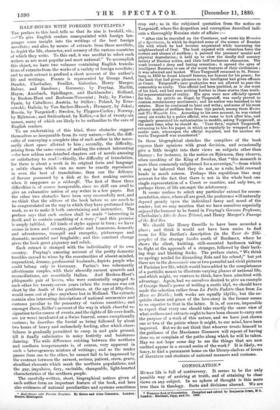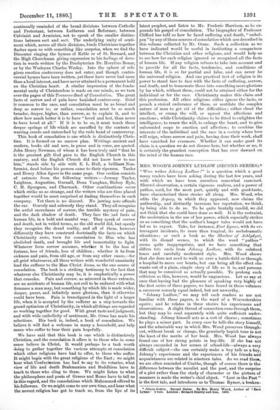CONSOLATION.
Hustas life is fall of controversy. It seems to be the only possible way of arriving at truth, and of attaining to clear views on any subject. In no sphere of thought is this more true than in theology. Sects and divisions abound. We are • Treasure-Book of Condones. OompLled sad edited by Benjamin Onne, MA. London : Marshall, Japp, and Co. 1880. continually reminded of the broad divisions between Catholic and Protestant, between Lutheran and Reformer, between Calvinist and Arminian, not to speak of the smaller distinc- tions between sect and sect. The underlying unity of senti- ment which, across all their divisions, binds Christians together flashes upon us with something like surprise, when we find the Dissenter singing the hymns of Keble or of St. Bernard, and the High Churchman giving expression to his feelings of devo- tion in words written by the Presbyterian Dr. Horatius Bonar, or by the Wesleyan Charles Wesley. Into the sphere of reli- gious emotion controversy does not enter, and though contro- versial hymns have been written, yet these have never had more than a local interest, and have never attained to a permanent hold on the Christian heart. A similar impression of the funda- mental unity of Christendom is made on our minds, as we turn over the pages of this Treasure-Book of Consolation. The great facts of sorrow and of pain have banished controversy. Grief is common to the race, and consolation must be as broad and deep as sorrow is; or rather, consolation must be so much broader, deeper, higher, than sorrow, as to explain it, and to show how much better it is to have "loved and lost, than never to have loved at an" If it is to be so, it must touch those deeper springs of life which are unruffled by the contests of warring creeds and untouched by the rude hand of controversy.
This book of consolation is one which is distinctively Chris- tian. It is formed on no narrow plan. Writings ancient and modern, books old and new, in prose and in verse, are quoted. John Henry Newman, of whom it has been truly said "that he is the greatest gift God gave to the English Church in this century, and the English Church did not know how to use him," stands side by side with E. L. Hull, a brilliant Non- formist, dead before his powers came to their ripeness. Tauler and Henry Anon figure in the same page. One section consists of extracts from the following writers :—Jeremy Taylor, Leighton, Augustine, Gurnall, Dean Vaughan, Bishop Ryle, C. H. Spurgeon, and Charnock. Other combinations occur which strike us as strange, and the writers who are thus placed together would be most surprised at finding themselves in such company. Yet there is no discord. No jarring note offends the ear. Gravely and solemnly they stand. They all recognise the awful sacredness of sorrow, the terrible mystery of pain, and the dark shadow of death. They face the :sad facts of human life, in a bold and manful way. They speak of sorrow and death, not in veiled terms, as the old world did, but openly they recognise the dread reality, and all of them, however differently they have construed doctrinally the facts on which Christianity rests, turn for consolation to Him who has abolished death, and brought life and immortality to light. Whatever form sorrow assumes, whether it be the loss of fortune, loss of friends, loss of children ; whether it be from sickness and pain, from old age, or from any other cause,—for all grief whatsoever, all these writers with wonderful unanimity lead the sufferer to the Man Christ Jesus, as the one source of consolation. The book is a striking testimony to the fact that whatever else Christianity may be, it is emphatically a power that consoles. Pain and sorrow, as mirrored in these extracts, are no accidents of human life, not evil to be endured with what firmness a man may, but something by which life is made wider, deeper, purer, and infinitely more glorious, than it otherwise could have been. Pain is transfigured in the light of a larger life, when it is accepted by the sufferer as a step towards the grand optimism of Christianity, in which all things are regarded as working together for good. With great taste and judgment, and with wide catholicity of sentiment, Mr. Orme has made his selections. His book is, indeed, a book of consolation. We believe it will find a welcome in many a household, and help many who suffer to bear their pain hopefully.
We have said that this book is one which is distinctively Christian, and the consolation it offers is to those who in some sense believe in Christ. It would perhaps be a task worth doing to gather together the various attempts at consolation which other religions have had to offer, to those who suffer. It might begin with the great religions of the East; we might hear what Confucianism has had to say to its votaries, what view of life and death Brahmanism and Buddhism have to teach to those who cling to them. We might listen to what the philosophers and poets of Greece and Rome have to tell us in this regard, and the consolations which Mahommed offered to his followers. Or we might come to our own time, and hear what the newest religion has got to teach no, from the lips of its latest prophet, and listen to Mr. Frederic Harrison, as he ex- pounds his gospel of consolation. The biographer of Professor Clifford has told us how he faced suffering and death, " unhol. pen "by any of those sources of consolation which are described in this volume collected by Mr. Orme. Such a collection as we have indicated would be useful in instituting a comparison between the Christian and other religions, and would help us to see how far each religion ignored or recognised all the facts of human life. If any religion refuses to take into account and to provide for all the facts, tendencies, and conditions of human life, it is so far partial and false, and can never be the universal religion. And one practical test of religion is its. power to stand face to face with the facts of suffering, sorrow, and, death, and to transmute these into something more glorious by far which, without them, could not be attained either for the individual or for the race. Christianity makes this claim and this profession. All other religions either ignore the facts, or preach a stoical endurance of them, or mutilate the complex nature of man to get rid of the difficulties ; either cloud the intellect, or cramp the will, or uproot the affections and emotions ; while Christianity claims to be fitted to enlighten the intelligence, to renew the will, to enlarge the heart, and to give unbounded scope to emotion and affection ; to combine the interests of the individual and the race in a society where love will reign, where sorrow and pain, having done their work, shall have vanished for evermore. Whether it can make good its claim is a question we do not discuss here, but whether or no, it is certainly the grandest conception that has ever dawned on, the mind of the human race.







































 Previous page
Previous page